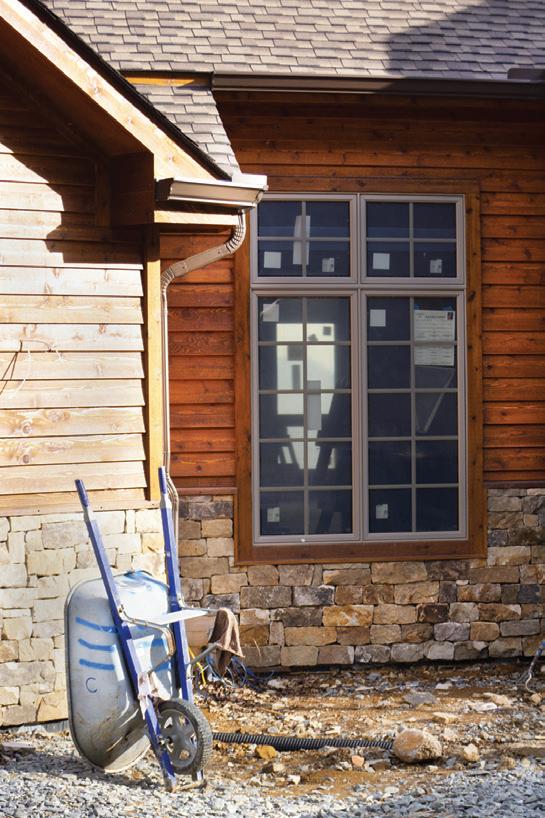
3 minute read
7 things to know before replacing windows
The decision to replace windows often comes down to aesthetics and necessity. Drafty windows can reduce energy efficiency in a home, requiring HVAC systems to work harder to keep interiors comfortable. The harder the HVAC must work, the more homeowners will pay in energy costs.

Advertisement

Old windows also may be points of entry for water and insects. Despite the importance of windows, Money magazine advises that new windows make up only a fraction of the home’s total exterior “envelope,” resulting in only about 5 to 15 percent of total energy savings. But there are still plenty of reasons to invest in new windows.
1. Vinyl or aluminum may be best. Lumber is farmed rather quickly today and solid wood products may not stand up to elements as well as wood used a half-century ago. To avoid rot, vinyl windows often are an affordable and durable choice. Homeowners also have the option of wood windows with aluminum cladding, which are long-lasting.
2. Moisture problems indicate windows need to be replaced. Condensation that shows up as fogging between double-pane windows or on the inside of windows indicates that the windows are starting to fail. If installing a vapor barrier in the basement or crawl space, ventilating properly when showering or cooking, or using a dehumidifier indoors does not remedy the situation, it might be time to replace windows.
3. Windows add curb appeal. Beyond functionality, replacement windows immediately update the look of the home and can improve curb appeal since they are one of the most prominent features on the exterior of a home. If a house needs an update, replacing windows and can be a quick and affordable update.
4. Consider other energy-efficient upgrades. Sometimes older windows can be salvaged, especially if they are not damaged and only moderately drafty. Replacing panes, sash cords, weather stripping, and even glazing may be less expensive than replacing a window. Plus, older homes with attractive windows complement one another. To keep energy bills down, think about adding insulation to the attic and basement — which is a good idea even if you are replacing windows.
5. The wrong windows can adversely affect home value. The National Association of Realtors says homeowners get about 73 percent of their replacement window investment back when they resell a home. But choosing the wrong windows might lower the value of the home. It’s important to match the look of the original windows, including window material and the divided light pattern (the number of panes in each window) with the original windows.

6. Think about soundproofing, too. When upgrading windows, also think about how certain windows can cancel out noises and make homes more soundproof. Some windows can help reduce outdoor distractions like leaf blowers or lawn mowers.
7. Proper installation is key to longevity. Replacement windows are only as good as their installation in many cases. Poor installation and orders of standard, rather than custom sized windows could result in poor fitting and seals. Homeowners should carefully vet and review window replacement contractors to find the best professionals for the job.
5 Factors To Consider When Buying A Home
2: Job security/availability
The financial resource Fortune Builder says to consider your job security before taking the home ownership plunge. Before committing to an investment as substantial as a home, ensure that you are secure in your job. Similarly, if you are relocating for job prospects, verify that the new location has a thriving job market.
3: Local schools
Home ownership is a dream for many people. In fact, buying a home is considered by many people to be a major life accomplishment. Various factors determine what makes a home an attractive place to live. While some considerations may overlap, others may be unique to individual buyers. Those new to the real estate arena may want to consider the following factors as they search for a new place to call home.
1: Property taxes
Property taxes can greatly affect the overall cost of living in a particular home. The real estate company RedFin says property taxes are generally levied by each county and often include taxes paid to schools, utility companies and municipal governments. Property taxes will usually be factored into a monthly mortgage payment, and how high (or low) taxes are can turn an affordable mortgage payment into something that can break a budget. When calculating payments, be sure to include property taxes in your estimates.
For potential homeowners with children or those planning on becoming parents, area schools should merit significant consideration. Research school rankings and reviews, but know that rankings can change. American Family Insurance Company says to also look at the school budget history of towns you’re considering to see if residents prioritize funding for education. This can be a measure of how important education is in a given community.
4: Commute times
Home ownership involves both lifestyle and financial decisions. Calculate the time it will take to travel to and from work when considering a certain town or neighborhood. Find out if there is mass transit and what options are available for off-hour travel needs.
5: Lifestyle options
Quality nightlife, arts and history, community events, proximity to cultural centers or cities, and other factors are at play in choosing a home. Make sure your new community allows you to still enjoy the things you’re passionate about.

Buying a home involves considering various factors that can affect your budget and quality of life.








